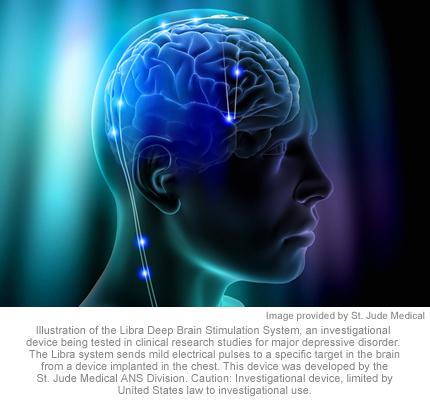 The study, called BROADEN™ (BROdmann Area 25 DEep brain Neuromodulation), is a controlled, multi-site, blinded study that is evaluating the safety and effectiveness of DBS in patients with depression for whom currently available treatments are not effective.
The study, called BROADEN™ (BROdmann Area 25 DEep brain Neuromodulation), is a controlled, multi-site, blinded study that is evaluating the safety and effectiveness of DBS in patients with depression for whom currently available treatments are not effective.
“We are excited to be part of the first double-blind study of Deep Brain Stimulation for depression and remain hopeful that this therapy may prove beneficial for this seriously ill patient population,” said Anthony D’Agostino, M.D., medical director of Alexian Brothers Behavioral Health Hospital and the principal investigator at the study site. “The study is an important contribution to the advancement of treatment options for severely depressed patients.”
This study is researching a specific area in the brain called Brodmann Area 25 that is thought to be involved in depression. The first research of DBS for depression was conducted in Toronto, Canada, by neurologist Helen S. Mayberg, M.D., and neurosurgeon Andres Lozano, M.D., in 2003. They published their findings in Neuron in March 2005, reporting that brain imaging studies indicate that Brodmann Area 25 appears to be overactive in profoundly sad and depressed people.
St. Jude Medical owns the intellectual property rights, and has various patents issued and pending, for the use of neurostimulation at Brodmann Area 25. The Libra Deep Brain Stimulation System provides mild pulses of current from a device implanted near the collarbone and connected to small electrical leads placed at specific targets in the brain.
“This depression study represents a continuation of our commitment to provide solutions for those who are suffering and in need of additional therapy options,” said Chris Chavez, president of the St. Jude Medical ANS Division. “The Brodmann Area 25 study is an important step in bringing physicians and their patients a neuromodulation therapy that, if successful, will treat this debilitating form of depression.”
The National Institute of Mental Health estimates that more than 21 million U.S. adults suffer from some kind of depressive disorder. Current therapies are effective for about 80 percent of this patient population according to the National Advisory Mental Health Council. That means approximately 4 million adult Americans live with depression that doesn’t respond to medications, psychotherapy or electroconvulsive therapy.
To be eligible for this study, participants must:
• Currently be diagnosed with major depressive disorder
• Be between 21 and 70 years old, with onset of first episode before age 45
• Have tried at least four treatments in their current episode, such as different medications, various combinations of medications or electroconvulsive therapy
• Have been depressed for at least one year
For more information about this study, call toll-free at 866-787-4332 or visit http://www.BROADENstudy.com.
Sponsored by St. Jude Medical, the BROADEN study is being conducted under a U.S. Food and Drug Administration (FDA) investigational device exemption (IDE). Initial study centers are located in Chicago, Dallas and New York City. This clinical study was preceded by a smaller pilot study of 20 patients at three sites in Canada which found that six months after the procedure, 56 percent of the patients experienced at least a 40 percent decrease in depressive symptoms. At last follow-up, 78 percent of the patients were responders, and eight of the patients have re-engaged in life activities such as work, school, travel and relationships, and three of the study patients are considered to be in remission. Patients’ symptoms were measured using the Hamilton Rating Scale for Depression.
Source: St. Jude Medical via Newswise
Â
